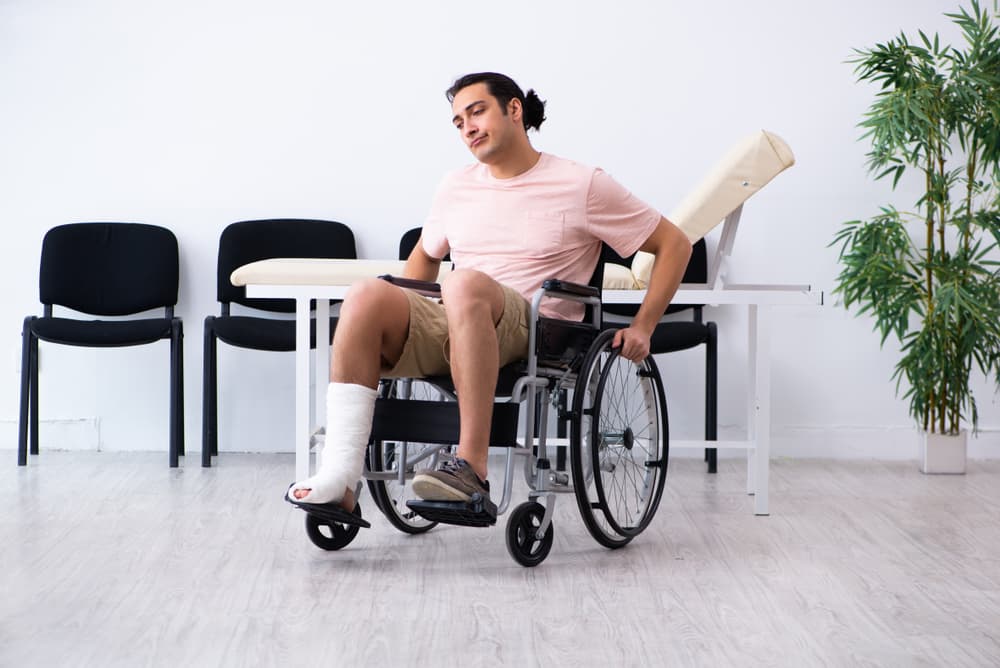Steven A. Bagen | March 6, 2024 | Motorcycle accident

Motorcycle accidents can happen due to various factors, including negligence of other drivers, poor road conditions, or mechanical failures of the motorcycle itself. These accidents can range from minor incidents to catastrophic events that result in serious injuries or even death. Sometimes, they can even cause permanent or long-term disability in victims.
If you or a loved one is facing severe injuries or disability after being involved in a motorcycle accident, contact a motorcycle accident attorney right away for help getting your claim started.
Understanding Disability after a Motorcycle Accident
A motorcycle accident can result in life-altering disabilities. Disabilities can vary in severity and affect various aspects of a person’s life. Understanding these disabilities is crucial for individuals who have been involved in motorcycle accidents.
Types of Disabilities Potentially Resulting from a Motorcycle Accident
In the context of a motorcycle accident, a disability refers to any condition or injury that significantly impairs a person’s ability to perform daily activities and tasks. This can include physical disabilities, such as spinal cord injuries, amputations, or traumatic brain injuries, as well as psychological disabilities, such as post-traumatic stress disorder (PTSD) or debilitating anxiety.
- Physical disabilities: Motorcycle accidents can cause severe physical injuries, such as spinal cord injuries, traumatic brain injuries (TBI), loss of limbs, fractures, and internal organ damage. These injuries can lead to permanent disabilities, making it challenging for individuals to perform daily activities or return to work.
- Cognitive disabilities: Traumatic brain injuries can result in cognitive impairments, including memory loss, difficulty concentrating, and problem-solving issues. These disabilities can significantly impact a person’s ability to function independently.
- Psychological disabilities: Motorcycle accidents can also lead to psychological disabilities such as post-traumatic stress disorder (PTSD), anxiety, and depression. These conditions can be debilitating and can require long-term therapy and treatment.
- Emotional disabilities: The emotional impact of a motorcycle accident can be significant. Individuals may experience emotional distress, grief, and loss, which can affect their overall well-being and quality of life.
Common Causes of Motorcycle Accidents
Several factors contribute to motorcycle accidents. Some common causes of motorcycle accidents include:
- Negligent drivers: Many motorcycle accidents occur when other motorists fail to notice motorcyclists on the road, such as changing lanes or making turns.
- Distracted driving: Drivers distracted by their phones, eating, or other activities are more likely to cause motorcycle accidents.
- Speeding: Speeding significantly reduces a driver’s ability to react to sudden changes on the road, increasing the chances of colliding with a motorcycle.
- Poor road conditions: Potholes, loose gravel, or debris on the road can cause a motorcyclist to lose control and crash.
Determining Liability in a Motorcycle Accident
Determining liability in a motorcycle accident is essential for seeking compensation for disabilities. Liability refers to establishing who is legally responsible for the accident and the resulting injuries. To determine liability, several factors are considered, including:
- Negligence: If another driver’s negligence, such as speeding, distracted driving, or reckless behavior, caused the accident, they may be held accountable for the injuries and disabilities sustained by the motorcyclist.
- Road conditions: If the accident occurred due to poor road conditions, such as a pothole or inadequate signage, the entity responsible for maintaining the road, such as a city, county, state, or contractor, may be held liable.
- Manufacturer defects: If the accident was caused by a defect in the motorcycle itself, such as faulty brakes or a defective part, the manufacturer may be held liable for the resulting disabilities.
Seeking Compensation for a Disability After a Motorcycle Accident
If you have become disabled as a result of a motorcycle accident, you have the legal right to seek compensation to help cover medical expenses, lost income, and other damages. Here are the steps to take when seeking compensation:
- Seek medical attention: Seek immediate medical attention after a motorcycle accident, even if you do not initially experience symptoms. Some injuries, such as internal bleeding or soft tissue damage, may not be immediately apparent. Sometimes, the adrenaline rush after an accident can cause you not to notice pain or other symptoms.
- Document your Injuries: Keep detailed records of all medical treatments, therapies, and medications related to your motorcycle accident injuries and disabilities. This documentation will be crucial for demonstrating the extent of your injuries and the associated costs.
- Gather evidence: Collect as much evidence as possible to support your compensation claim. This may include police reports, eyewitness testimony, accident scene photographs, and other relevant documentation.
- Consult with a motorcycle accident lawyer: It is highly recommended to consult with a lawyer who specializes in motorcycle accident cases. They will guide you through the legal process, help determine liability, and fight for your rights to fair compensation. They can take on many of these tasks, allowing you the time and space to heal.
- File a claim: Your lawyer will help you file a claim against the responsible party, whether it is another driver, a government entity responsible for road maintenance, or a motorcycle manufacturer. They will ensure that all necessary paperwork is completed accurately and within the required time frame.
- Negotiate or litigate: Your lawyer will handle negotiations with insurance companies or pursue litigation if a fair settlement cannot be reached out of court. They will fight for your rights and work to secure the maximum compensation you deserve for your disabilities.
The Importance of Hiring a Lawyer after a Motorcycle Accident
Hiring a lawyer after a motorcycle accident is crucial for several reasons:
- Legal experience: A lawyer specializing in motorcycle accident cases has the knowledge and experience necessary to navigate the complexities of personal injury law. They understand motorcycle accidents’ unique challenges and laws and will provide you with the best legal advice.
- Maximizing compensation: An experienced lawyer will work tirelessly to ensure you receive the maximum compensation possible for your disabilities. They will analyze all aspects of your case, including medical bills, future treatment costs, lost income, and emotional distress, to calculate the appropriate value of your claim.
- Handling insurance companies: Dealing with insurance companies can be challenging, as they may try to minimize the value of your claim or deny it altogether. A skilled lawyer will handle all communication with the insurance company on your behalf, ensuring your rights are protected and you receive fair compensation.
- Filing deadlines: There are strict deadlines for filing a personal injury claim after a motorcycle accident. A lawyer will ensure all necessary paperwork is filed within the required time frame, avoiding any potential issues that can harm your chances of receiving compensation.
- Peace of mind: Dealing with the aftermath of a motorcycle accident and coping with disabilities can be overwhelming. Hiring a lawyer allows you to focus on your recovery and well-being while they handle the legal aspects of your case.
Insurance Coverage for Motorcycle Accident Disabilities
Insurance coverage for motorcycle accidents varies depending on the specific circumstances and the type of coverage held by the parties involved. In most cases, motorcycle riders are required to have a minimum level of liability insurance to cover damages caused to others in the event of an accident. This coverage may also provide compensation for disabilities resulting from the accident to some extent.
In addition to liability insurance, other types of coverage may be available to motorcycle riders, such as medical payment coverage or personal injury protection (PIP). These policies may provide additional benefits and coverage for disabilities resulting from a motorcycle accident. You will want to review the details of your insurance policy and consult with an attorney to understand the extent of coverage available.
Filing a Disability Claim
Suppose you are disabled as a result of a motorcycle accident. In that case, it is vital to file a disability claim to seek compensation for your losses and related expenses. Filing a disability claim can be complex, so seek legal assistance from an attorney experienced in motorcycle accident cases.
To file a disability claim, follow these steps:

- Seek medical attention: Visit a healthcare professional immediately after the accident to document your injuries and receive necessary treatment. Your medical records will provide crucial evidence for your disability claim.
- Gather evidence: Collect all relevant evidence related to the accident, including police reports, witness statements, photographs of the accident scene, and any other documentation that supports your claim.
- Document your expenses: Keep track of all your medical bills, rehabilitation costs, assistive devices, and other expenses related to your disability. These records will help establish the financial impact of your disability on your life.
- Contact an attorney: Consult a qualified personal injury attorney specializing in motorcycle accident cases. They will guide you through the process, help you gather evidence, and negotiate with insurance companies on your behalf.
- Submit your claim: Your attorney will assist you in preparing and submitting your disability claim to the relevant insurance company. This claim should include all necessary documentation and evidence to support your case.
- Follow the claims process: Once your claim is submitted, the insurance company will review it and determine the extent of your disability. They may request additional documentation or evaluations to assess your condition thoroughly. Be sure to follow their instructions and provide the requested information promptly.
- Negotiate a settlement: Your attorney will handle negotiations with the insurance company to seek a fair settlement for your disability claim. They will advocate for your rights and work towards securing the compensation you deserve.
Medical Documentation and Evaluation
Thorough and accurate medical documentation is crucial in supporting your disability claim after a motorcycle accident. Your medical records should contain detailed information about your injuries, the treatments received, and the impact of these injuries on your daily life.
To strengthen your disability claim, ensure that your medical documentation includes the following:
- Detailed descriptions of your injuries, including any fractures, soft tissue injuries, or neurological impairments.
- Diagnostic test results, such as X-rays, CT scans, or MRIs, that provide objective evidence of your condition.
- Treatment records and progress notes that outline the medical interventions you have undergone and their effectiveness.
- Documentation of any ongoing rehabilitation therapies or medical appointments related to your disability.
- Statements from healthcare professionals explaining the long-term implications and limitations resulting from your injuries.
- Any other relevant medical opinions or evaluations that support your disability claim.
Determining the Extent of Disability
The determination of the extent of disability resulting from a motorcycle accident is a critical step in the claims process. Insurance companies use various methods to assess the severity of the disability and its impact on your ability to perform daily activities, work, and enjoy life.
Some factors and evaluation procedures that may be considered in determining the extent of disability include:
- Medical records and documentation: Insurance companies review your medical records to assess your injuries’ severity and long-term implications. They may consider the type and extent of your injuries, the treatments received, and any ongoing medical care or rehabilitation therapies.
- Independent medical evaluations (IME): As mentioned earlier, insurance companies may require an IME to obtain an unbiased assessment of your condition. The healthcare professional conducting the IME will evaluate your injuries and disabilities, considering factors such as physical limitations, pain levels, and the impact on your daily life.
- Functional capacity evaluations (FCE): FCEs are tests conducted by healthcare professionals to assess your physical abilities and limitations. These evaluations measure your strength, flexibility, mobility, and endurance, providing objective data on your functional capabilities in various activities.
- Vocational assessments: In some cases, insurance companies may request a vocational assessment to evaluate your ability to perform work-related activities. This assessment considers factors such as your education, skills, work experience, and physical limitations to determine your employability after the accident.
The combination of these evaluations and assessments helps insurance companies determine the extent of your disability and the compensation to which you may be entitled.

Contact a Motorcycle Accident Attorney Today
If you have been disabled as a result of a motorcycle accident, it is crucial to understand the types of disabilities that can arise, determine liability, and seek compensation. Hiring a skilled personal injury lawyer will provide you with the skills and guidance needed to navigate the legal process and fight for your rights to fair compensation. Don’t hesitate to seek legal assistance and take the necessary steps to protect your future after a motorcycle accident.
